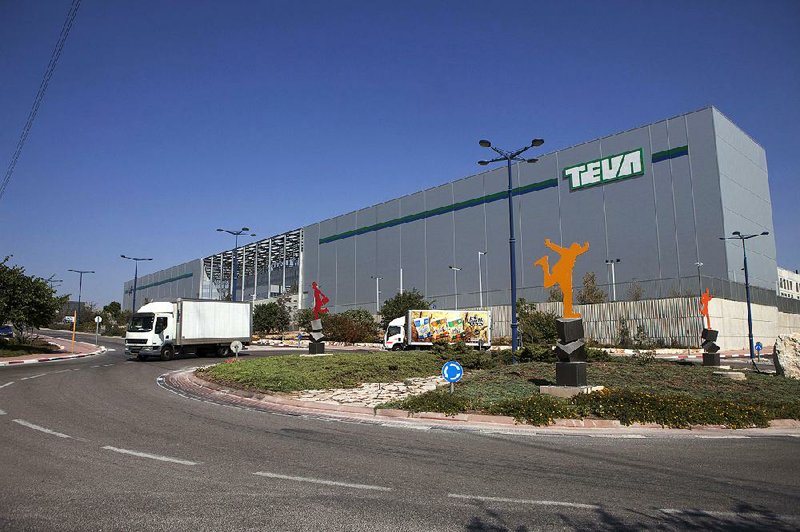TRENTON, N.J. -- Generic drug giant Teva formally offered to buy fellow drugmaker Mylan for about $40.1 billion in cash and stock Tuesday, despite Mylan's cold shoulder and the certainty the proposed acquisition will bring intense scrutiny by antitrust regulators.
If Israel-based Teva Pharmaceutical Industries Ltd. succeeded, the combination would dominate the global generic drug market, be a major contender in some other specialty drug categories and have the leverage to try to raise the price of generic drugs.
After years of stability, generic medicine prices recently have risen several percent a year on average. Some have skyrocketed by up to 1,000 percent, generally when competition vanishes because of consolidation or shortages caused by manufacturing quality problems.
A tie-up not only would increase Teva's scale -- allowing it to increase profitability by cutting jobs and other costs -- but it also would increase its leverage in negotiating drug prices with insurers and other payers, said Les Funtleyder, health care portfolio manager at E Squared Asset Management.
"That's going to feed into regulators' interest," he said.
That's particularly true in the U.S., where seven of eight prescriptions filled are for generics, and employers, insurers and government health programs encourage their use to hold down costs.
"It doesn't mean the deal can't be done," because the companies could divest some assets, Funtleyder said, but he noted Mylan's reluctance.
A tie-up between Teva and Mylan "is without sound industrial logic or cultural fit," Mylan Executive Chairman Robert Coury said in a statement Friday. What's more, "there would be significant overlap in the companies' businesses, and we believe that it is unlikely that any such combination could obtain antitrust regulatory clearances."
The Dutch company said it prefers to remain a stand-alone company and instead buy generic drug and ingredients-maker Perrigo Co. PLC. Ireland-based Perrigo on Tuesday rejected Mylan's recent offer of about $29 billion, saying it is too low.
Teva said Tuesday that it had studied the regulatory issues and is confident the deal can be consummated. The takeover offer is contingent on Mylan ending its pursuit of Perrigo.
"Pharma companies are very sophisticated on antitrust, and they know what they need to divest to get the deal through," said Jennifer Rie, a Bloomberg Intelligence analyst on antitrust issues. "Chances are great that Teva has a very good idea what will have to be sold off."
Teva's bid for Mylan, part of the latest cycle of drugmaker consolidation, would be one of the biggest in the last couple of years, below Actavis PLC's recent $66 billion purchase of Allergan Inc., based on figures from market research firm EvaluatePharma.
Mylan's shares rose $6.03, or 9 percent, to close Tuesday at $74.07, while Teva shares gained 87 cents, or 1.4 percent, to close at $64.16.
Teva offered $82 per share, a 21 percent premium over Mylan's Monday closing price, and said it could complete the deal by year's end. Teva's board has unanimously approved the offer.
Teva gets half its revenue from generic drugs and another fifth from its top brand-name medicine, multiple sclerosis drug Copaxone. Last Thursday, U.S. regulators approved a generic version of Copaxone, which could hit pharmacies around September, endangering $4.2 billion of Teva's $20 billion in annual revenue.
That means Teva, which also makes respiratory, cancer and nonprescription medicines, needs new revenue sources.
"The attraction for Teva is that this deal would immediately allow them to grow and reduce their exposure to the impending drop in Copaxone sales," said Sam Fazeli, an analyst at Bloomberg Intelligence in London.
In March Teva agreed to buy Auspex Pharmaceuticals Inc., which is developing central nervous system disorder treatments, for $3.2 billion.
Mylan last year earned $929.4 million on $7.72 billion in revenue, nearly 85 percent of that from the more than 1,400 generic drugs it sells. Its specialty segment sells the EpiPen allergic reactions treatment, which brought in $1.19 billion in 2014.
Information for this article was contributed by Linda A. Johnson, Michelle Chapman and Marley Jay of The Associated Press and David Wainer, Ed Hammond and Crayton Harrison of Bloomberg News.
Business on 04/22/2015
